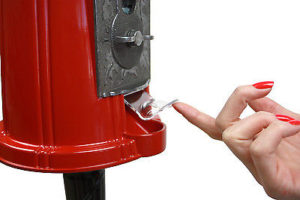 Consider the gumball machine; it’s a relational analogy that works.
Consider the gumball machine; it’s a relational analogy that works.
Practically speaking, it should be understood that in any relationship there is a give-and-take dynamic. It should not be a matter of I’m-gonna-get-what-I’ve-got-coming-to-me sort of attitude, but rather a natural, mutual desire to meet the needs of the one we say we care most about. Both people make investments of goodwill for the sake of the other, and both enjoy the benefits of one another’s gracious contributions.
But what happens when one person consistently, intentionally fails to demonstrate love and care toward the person they claim to love?
In an abusive relationship, the enabler-victim in the relationship is almost always in a perpetual struggle to reach the heart of her* abuser. Although he is cold, emotionally cruel and frighteningly unpredictable, she remains committed, believing that her persistent love will reap its intended outcome – a healthy, mutually respectful, intimate partnership. So day after day, by her practical and emotional investment, she puts a nickel into the proverbial gumball machine hoping to receive a small, reasonable return on her investment, if not today, then perhaps tomorrow – or the next day.
She reminds herself to be patient, learns to go without, and tries to dismiss his cruel words and habitual selfishness and neglect. When he is hurtful, she tries to talk to him about her needs and longings, but rather than hearing her, embracing her and endeavoring to remind her of her worth, he instead insists that she is overly sensitive and needy.
Nevertheless, she continues to look for ways to remind him of her love, does those little extra things that she thinks will make him happy and help him to see how hard she is trying, believing that he will one day reciprocate. Over time, she begins to wonder if or when she will receive the kindly attention and genuine affection she craves. As hard and frustrating as it is, day after day she puts her nickels into the gumball machine and expectantly waits to hear the sweet morsel as it tumbles down the chute and falls into the cradled palm of her hand – concrete evidence of his love for her. But as hungry as she is for the reward, it doesn’t come.
As the months or years pass, she might receive an occasional pat on the back or a sterile kind of “You know I love you” from her abuser’s lips, but those words cannot compensate for the countless coins of care she has invested with so little return. Of course, we don’t love our spouse demanding a reward, but realistically, in a marriage, it is perfectly reasonable to expect one – healthy measures of genuine, spontaneous tenderness, affirmation and encouragement. In a practical sense, our spouse’s presence should be the safest place to be. But in an abusive relationship, the abuser expects his victim to keep investing in him while he offers little but endless criticism and a hostile, demanding presence.
So after so many months or years, why would anyone be surprised when the abuse victim leaves? There is no mutual love there. She has been emotionally bankrupted. She has no nickels left to give.
But what happens when she finally leaves? Typically, her abuser will suddenly chase after her. He will offer a one-size-fits-all apology, tell her, “It will never happen again,” and expect her to unquestioningly return to him. And what kind of fallout might she expect should she refuse to buy in? What if she doubts his sincerity, having no reason to trust his words? What if her instincts are telling her that nothing has really changed? What if she feels certain that she must keep her distance?
In most instances, the abuser will soon become angry, and his weary victim will hear, “I said I’m sorry. You need to get over it and forgive me and come back to me.”
With demanding anticipation, he will exclaim, “How dare you keep me waiting? How dare you turn me away? How dare you be so selfish and unfeeling?”
At this point, the truth is that he has invested nothing, so his victim owes him nothing.
Yet the abuser will almost always have the audacity to whine, moan, groan and complain, saying essentially, “Hey, I put in my nickel. Where’s my gumball?”
###
*Although abusers can be of either gender, the overwhelming majority of abusers are male; therefore, the abuser is referenced in the masculine. The reader’s understanding is appreciated.
Copyright 2017, All Rights Reserved

 that your relationship is normal only to one day be jolted by the reality that there is nothing normal about it, to be forced to admit that your relationship is patently unhealthy, destructive, and yes, abusive.
that your relationship is normal only to one day be jolted by the reality that there is nothing normal about it, to be forced to admit that your relationship is patently unhealthy, destructive, and yes, abusive.  “Strange game. The only winning move is not to play.” WarGames
“Strange game. The only winning move is not to play.” WarGames